Pantheon Read online
Contents
Cover
Pantheon – Guy Haley
About the Author
A Black Library Publication
eBook license
Pantheon
Guy Haley
There was a lantern in the skies over Azyr – shining Sigendil, the High Star of Azyr, beacon of Sigmaron. Surrounding its body was a mechanism of great art, a thing of sliding spheres pierced with fretwork. With the shifting of the immense clockwork Sigendil twinkled, and shone the brightest of all the stars in the heavens of the Celestial Realm.
The inhabitants of Azyr loved it well. Sailors charted safe courses across stormy seas by its light. Mothers hushed crying children and pointed, saying, ‘There is the holy light of our God-King, see how he watches over you as you sleep.’ Merchants swore oaths by it and laws were ratified by its light, so constant it was, for Sigendil never moved from its appointed place in the sky as other stars did. In an age of awful wonder, the matchless light of Sigendil was a source of certainty.
But though it was itself invarying, Sigendil had witnessed change, even in Azyr.
Far to the north towered Mount Celestian, Azyr’s greatest peak. Only once in history had the mountain been assailed, when Sigmar’s great hammer Ghal Maraz smashed its peak away, leaving a lofty plateau dominated by a lake of shining blue. Upon its shores he built a city whose scale and glory outshone even Azyrheim, for it was made to be the abode of gods, not mortals. The divine survivors of the World-That-Was gathered under Sigmar’s banner on Celestian, to rule the Eight Mortal Realms.
There was a castle of bones so huge one would think them carved fancily, though any who touched them would find them dry and osseous. Another dwelling was a wooden stockade, much splintered and strewn about with more bones, these gnawed upon. To the east were twin, squat fortresses, one of iron and one of frozen fire. To the west was a trio of slender towers whose forms, though similar, reflected the differing temperaments of their builders. In a vale of scented woods where the waters of Lake Celestian tumbled to the lands below, grew an oak of inconceivable size.
At the centre of the city temples gathered upon a vast silver acropolis. From their midst a tower of blue light pierced Azyr’s busy skies. Atop it was situated the Court of the Gods, a colonnaded space from whose vantage all the Mortal Realms could be seen. Thrones fit for titans ringed it – bone for Nagash, white marble for Tyrion, silver for Teclis, dark stone for Malerion, fire-hued amber for Grimnir and rustless steel for his brother, Grungni. Alarielle’s was of pale heartwood rooted in the stone, while Sigmar’s own gleamed golden. The thrones looked inward to the legendary Mirror of Bayla, a gleaming sheet of silver four yards across.
Together, mountain, city and court were known as the Highheim, the parliament of the gods in more peaceful ages.
No longer. The court had stood deserted for aeons.
The Ages of Myth had passed thousands of years ago. Mortals had forgotten the Highheim. Silence lay upon the city as thickly as the spent stardust that drifted in its thoroughfares.
That day, life returned a while. A lone figure trod the court. Noble of aspect and mightier than the greatest mortal, he was dwarfed by the buildings, and so his own stature was uncertain. He looked like the man he had been, ages gone in a different world. But god he was – Sigmar, the architect and lord of the city, and uniter of the gods.
Sigmar stood between the columns. Overhead the spectacular heavens of Azyr turned, to the south blazed matchless Sigendil, almost but not quite obscuring the husk of the World-That-Was behind it. Scented wind teased out Sigmar’s long golden hair and stirred his cloak.
He waited impatiently. Though a god, he had a man’s humours still. His patience had been exhausted by the long vigil of the Age of Chaos. Now his war was in motion, Sigmar had ceased to plan. He wanted to act.
Yet he must wait.
Night did its complex dance, the wheeling stars a backcloth to the motions of zodiacal beasts and divine mechanisms that sailed the lower heavens. Dawn arrived to find Sigmar deep in thought, head bent over the Mirror of Bayla. Would she come? He did not truly know. Their friendship had passed with the elder days.
The first rays of the sun struck the white pediment of the colonnade, washing marble orange. Sigmar’s head rose. Sensing magic, he stood.
A glow took hold around the throne of Alarielle. The ancient wood creaked and groaned. It emitted a screeching crack, so that Sigmar thought it might explode, but it shuddered, and from its tall back fresh shoots sprouted, growing unnaturally fast, leaves budding from them as they unfurled and reached skyward. The throne’s roots flexed, cracking the paving, the slow might of trees quickened by divine power.
There was a wink of light, then another, and another still, until a cloud of golden motes danced around like fireflies. The swarm thickened and coalesced, becoming the form of a tall, proud woman. The scent of rising sap and luxuriant flowers wafted over the god king. The lights solidified, until the features of Alarielle could be clearly discerned. Light faded. The throne put out a crown of fragrant blossom, framing the goddess’ broad wings of leaf and wood in white flowers.
Alarielle wore a crescent helm-crown, and carried a sinuous glaive. Her pale green skin was like that of a beautiful mortal’s, save her right hand, which was of strong, clawed branches.
Sigmar broke into a smile. ‘Alarielle, the lady of life. You came.’
Alarielle walked toward him, the motes of magic that made her image breaking apart a little as she moved. Her presence made the mirror shine. ‘I can spare you this projection, Sigmar of the tribes of men, for a short while. Speak and tell me why you called me back to this place.’
‘I thank you for coming. I appreciate the effort you have put forth.’
‘You do right in thanking me.’ Where she trod, delicate flowers sprang from the cracks in the paving. ‘The days when you might summon me are no more, prince.’ Her pupilless green eyes flashed in challenge.
Sigmar bowed. ‘I would not dream of summoning you. I invited, you responded. It is so good to see you again.’
A small smile curved Alarielle’s lips. ‘So the mighty Sigmar has learned humility. I had thought to find you more arrogant than ever. Your armies march across all the Mortal Realms. To unleash war on the four lords of Chaos alone is not the act of a humble man. Your rashness almost ended me, you realise.’
‘For that, my lady, you have my eternal apologies.’
She walked past him, trailing the smell of growth and new life, and looked out over the Highheim’s deserted ways. ‘No matter. Your actions, though impetuous, led to my rebirth and reinvigoration. You reawakened me. I spent too long brooding on defeat. If you had not caused my death, I would have been destroyed.’ She swept her gaze across the empty city. ‘So much beauty here, but it is sterile, bereft of life and purpose. It saddens me,’ she said. She looked at him. ‘I believed in your vision once, but it failed. If you have come to ask me to rejoin you here, to reform the pantheon of old, I will not.’
‘I did not ask you here to reform our old order,’ he said. ‘Perhaps one day, but not now.’
‘Perhaps then I will be interested, when a new season comes upon me,’ she shrugged. ‘Perhaps not.’ She sighed, the air she exhaled dancing with colourful insects. ‘If you ask for alliance, you already have it. My warriors fight alongside yours. Any reluctance the wargroves felt toward your warriors of lightning is fading. War is joined on all fronts.’
‘I thank you for that also,’ he said, ‘and my Stormcast Eternals will aid the people of the forests wherever they may be found. But asking for alliance is also not my intent.’
‘Then what do you want from me?’ she as
ked, curious.
‘Something more subtle than blades,’ he said. ‘Come with me.’ He reached to take her hand. His fingers passed through the glowing lights making up her form, but she followed when he walked to the flat silver of the Mirror of Bayla.
‘The gift of the Mage Bayla to the pantheon of old,’ he said.
‘I remember,’ she said. ‘Its use allows the viewer to see whither he will, be it in any realm.’
‘That is so,’ he said. He passed a hand over the metal. ‘It is into the past that we shall look, into another time and place. We will witness the quest of Sanasay Bayla himself.’
‘Are we to see the forging of this artefact?’ she asked.
Sigmar smiled. ‘We shall look back further than that, to the time he was a sage and a seeker in Andamar, at the far edges of Ghyran.’
‘A seeker after what?’ asked Alarielle. Her concern was rarely with thinking creatures of flesh. Her domain was of plants and growing things, and the wild spaces of the worlds. She knew little more of Bayla than she did of other short-lived fleshlings.
The mirror filled with swirling cloud. Lights flashed in the vapour, steadying until an image could be seen: a handsome man with walnut brown skin and a ready smile. Intelligence flashed in his eyes, and a hunger.
‘He sought what all mortals seek,’ Sigmar said. ‘Knowledge.’
The image clarified, and the two gods looked back far in to the past, to a time before the coming of Chaos.
There came a day when the Mage Sanasay Bayla had learned all he could from the great minds of his era. After long study he was acclaimed as the finest thinker of his generation, and the most powerful wizard in all of Ghyran. His family rejoiced in his achievements, but for him it was not enough. Sanasay Bayla lacked purpose, and it troubled him.
He lay in bed, staring through the glassless windows at dancing green auroras over the south. In Andamar, Ghyran’s life ran even into the sky.
Bayla exhaled loudly, waking his wife.
‘What are you sighing about there, Sanasay?’ she said sleepily.
‘I do not mean to wake you,’ he said.
‘You did.’ She smiled and rested her hand on his chest. ‘What troubles you, my love?’
He was silent, and so his wife poked him.
‘You lay hands on the greatest mage in Andamar, if not all of Ghyran?’ he asked in mock outrage.
She laughed, a sound that meant the most to him in all the world. ‘Tell me. If the greatest mage in Andamar, if not all of Ghyran, cannot confide in his wife, then he is a poor man, though a great wizard.’
Bayla frowned and laced his fingers behind his head. ‘I have unlocked many of the mysteries of the world,’ he said. ‘I have mastered five of the eight schools of pure magic. I understand the rest well enough, and know sufficient of the darker arts to leave them alone. Every question I ask, I find the answer to. I am bored, my wife. I must set myself a challenge that will test me. I need a purpose. I need to know why I do what I do, and to what end I should put my great knowledge.’’
‘You could try getting up early every day, organising the household, seeing the children are cared for and that our finances do not collapse while you are riddling with fell beings,’ she said. ‘There is purpose there.’
He harrumphed.
‘I am teasing you, my love.’ She yawned.
‘I am without goal or cause. I must find out what it is I want,’ he said. ‘Then I shall be satisfied.’
‘What of the Realms’ End? You have never been there. It is said all knowledge can be learned where the realms cease to be.’
‘A myth,’ he said. ‘I determined long ago that it does not exist. The Realms are vast, perhaps infinite. I have travelled far, but never seen it. Every text I read suggests it is only a story.’
‘Then be content with what you have, my darling.’
‘Although I have much, the concern dogs me that there is more, if I but knew what to look for,’ he said worriedly. ‘I risk missing my greatest achievement.’
‘Surely the gods could help,’ she said. ‘Why don’t you ask them?’
She fell asleep. Sanasay Bayla could not. A new idea had come to him complete, and he set about planning its execution.
His wife probably meant for him to go to the temples, and consult with the priests there. But Sanasay was not like other men.
In Andamar’s Temple of Teclis the Wise, there was a tower of marble so slender only one person could climb the winding stair. As the stair neared the peak, it grew so narrow that the climber must proceed sideways. Finally, it opened via a thin hole onto a platform big enough for a single person to sit. On every side was a dizzying drop. The tiniest slip would condemn a man to a long fall and a swift death. Sanasay could have cast a spell upon himself, or used one of his marvellous devices, or conjured a great beast to fly to the top of the tower, but the gods dislike those that cheat.
He crept onto the pinnacle. Wind tugged at him as he unwrapped his mat and laid it on the moist stone, careful not to drop the sacred objects rolled within. When they were laid out in the proper manner, he sat cross-legged in the middle of the pinnacle. He poured a single drop of mona nectar into a silver cup, whispering the necessary incantations, and drank it back. The bitter liquid made his tongue burn, but the sensation quickly passed, and his mind buzzed as it moved to a different plane.
Sanasay Bayla slipped into a deep trance.
When he opened his eyes, he was walking upon clouds in a world with five suns. A nearer radiance turned the clouds to gold, forcing his eyes into slits. When he opened them, there was a tall figure not far ahead, made from purest light. His features were similar to man but he was not of his race. His garb was outlandish.
‘Great Teclis!’ called Bayla, and fell to his knees on the clouds.
‘Sanasay Bayla,’ said Teclis. ‘The quester after knowledge. You are brave to seek out the gods. I and my brother have watched you with much interest.’’
‘Great Teclis,’ said Bayla, ‘who is the god of wisdom and arcane secrets. I beseech you, in all my–’
‘Hush now, Bayla,’ said Teclis in amusement. ‘I know why you look for me. You wish to know if Realms’ End is real, and how you might get there if it is.’
Bayla was not surprised the god could see into his thoughts. Teclis was the greatest wielder of magic in all the Realms.
‘You have this hunted for this place before, but gave up,’ said Teclis.
‘I convinced myself it did not exist. Foolishly, perhaps.’
‘I admire your dedication to your art, Sanasay Bayla,’ said the god. ‘I have known only a handful of your species able to learn so much of the ways of magic. But let it be known to you – too much knowledge is dangerous.’
‘You warn the forewarned,’ said Sanasay humbly.
‘I will tell you, for your motives are pure and your achievements many. Realms’ End exists.’
Bayla felt an uplifting in his heart. ‘How can I go there?’
‘There is a gate in the circling mountains that bound your land, those that no man has crossed. The gate leads into a tunnel that takes a route not of this plane. On the far side, Realms’ End is to be found.’
‘I will set out immediately!’ said Bayla.
‘There are two things you must know. The gate is locked, and there is no key. Only he who can forge the unforgeable can furnish you with one. On the far side is a monster which only death can kill. Find a way to overcome these obstacles, and Realms’ End will be open to you.’
‘I thank you, my lord,’ said Bayla gratefully.
‘Sanasay,’ said Teclis. ‘Be warned. This quest will consume you. You will discover your heart’s desire, but you may not like what you find. Perhaps it would be best for you to remain at home.’
‘I cannot know what it is until I see it,’ said Bayla sadly. ‘Thoug
h the risk is great, I must witness it for myself.’
‘Then go with my blessing,’ said Teclis. There was a clap of thunder. Bayla fell through the clouds. He landed hard in his meditating body. It rocked dangerously as he awoke, but he did not fall.
So it was he set out on his next task.
His wife pleaded with him not to go. The Iron Temples of the duardin were many years of travel away, and there was no guarantee its guardians would allow him within the precincts.
‘I must!’ he said. His young children clustered around their mother, and clutched at her skirts, but he was blinded by anguish, and could not see their tears. ‘What if I turn away, and never realised my full potential?’
For six years he travelled, through many realmgates and over hundreds of lands. Finally, older, scarred and weary, he came to the Iron Temples in Chamon’s Ferron Vale.
‘You cannot enter,’ said the temple guard, when Bayla had stated his case. ‘This is sacred ground, dedicated to Grungni. No manling may go within.’ So the conversation began, and so it continued, developing into bargaining, then arguing, but the duardin remained unmoved, and they would not let him inside.
Bayla went high into the mountains, where he could overlook the carved peaks and smoking forges of the Iron Temples. Powerful runes glowed in the rock and metal of its walls. For all his sorcerous ability, the wards of the temple were forever denied.
Miserable, Bayla descended the mountains into forests of iron-thorned trees. By a wall of rock aglitter with veins of ore, he made his camp and settled down for a night of brooding, staring into the flames of his campfire.
‘Won’t let you in, lad?’ said a gruff voice.
Bayla started. Without his noticing, a duardin had taken a seat on the far side of the fire. His face was hooded, but from the shadows protruded a white beard of impressive length, and he smoked a pipe of bone so ancient it was polished smooth and stained dark with use. Bayla knew enough of Grungni’s folk to recognise an elder when he saw one.
The stranger chuckled at Bayla’s reaction. ‘Sorry, lad, I have a habit of creeping up on people. My apologies. Do you mind if you share your fire?’

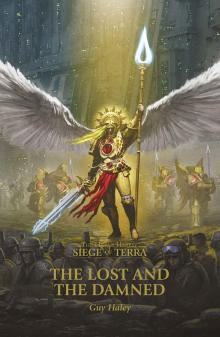 The Lost and the Damned (The Horus Heresy Siege of Terra Book 2)
The Lost and the Damned (The Horus Heresy Siege of Terra Book 2)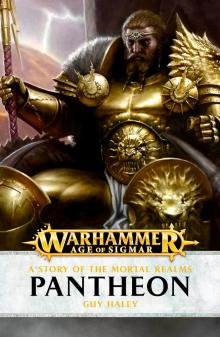 Pantheon
Pantheon Man of Iron
Man of Iron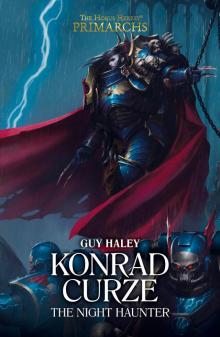 Konrad Curze the Night Haunter
Konrad Curze the Night Haunter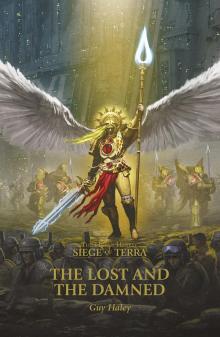 The Lost and the Damned
The Lost and the Damned Dark Imperium
Dark Imperium Hoppo's Pies
Hoppo's Pies Dark Imperium: Plague War
Dark Imperium: Plague War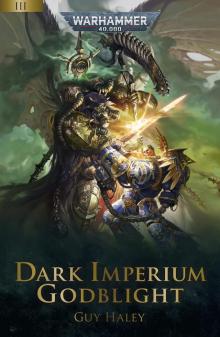 Dark Imperium: Godblight
Dark Imperium: Godblight Crash
Crash Titandeath
Titandeath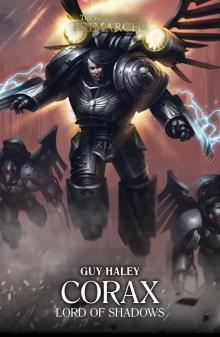 Corax- Lord of Shadows
Corax- Lord of Shadows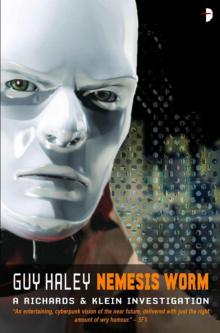 The Nemesis Worm
The Nemesis Worm Wolfsbane
Wolfsbane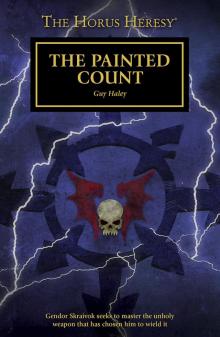 The Painted Count
The Painted Count The Death of Integrity
The Death of Integrity Perturabo: Hammer of Olympia
Perturabo: Hammer of Olympia Evil Sun Rising
Evil Sun Rising The Emperor's Railroad
The Emperor's Railroad Shadowsword
Shadowsword Pharos
Pharos Stormlord
Stormlord Throneworld
Throneworld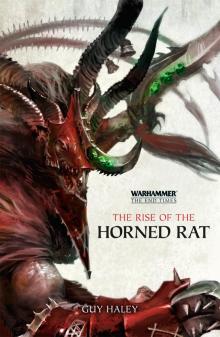 The End Times | The Rise of the Horned Rat
The End Times | The Rise of the Horned Rat Death of Integrity
Death of Integrity Omega Point
Omega Point Omega point rak-2
Omega point rak-2 Dante
Dante The Ghoul King
The Ghoul King The Devastation of Baal
The Devastation of Baal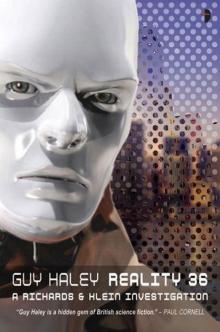 Reality 36: A Richards & Klein Novel
Reality 36: A Richards & Klein Novel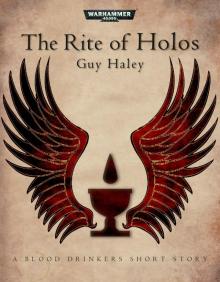 The Rite of Holos
The Rite of Holos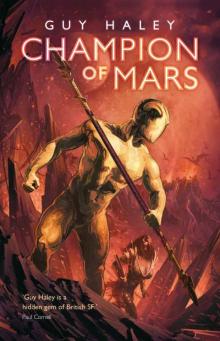 Champion of Mars
Champion of Mars Crusaders of Dorn
Crusaders of Dorn Baneblade
Baneblade